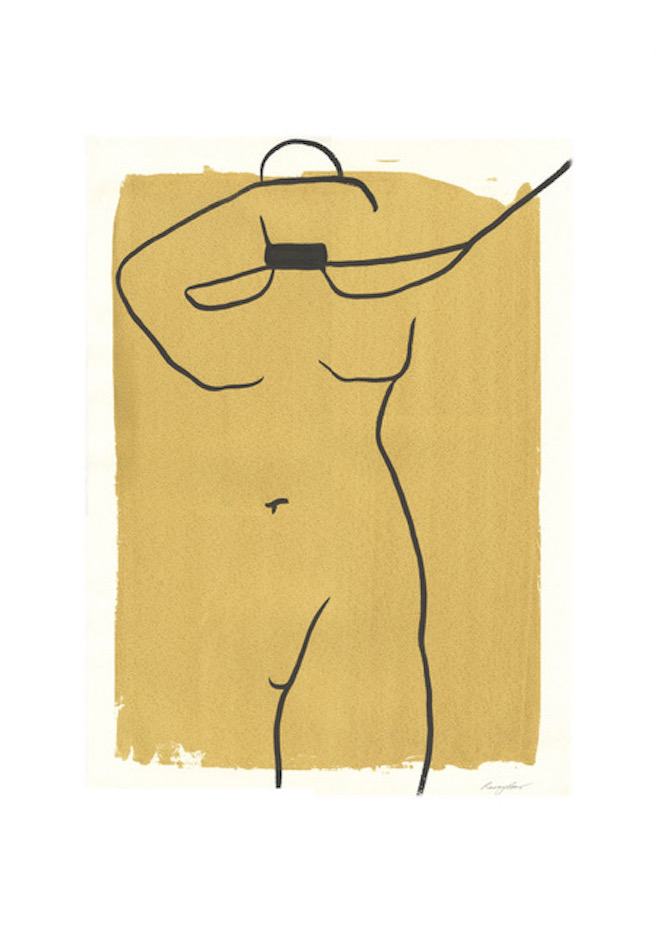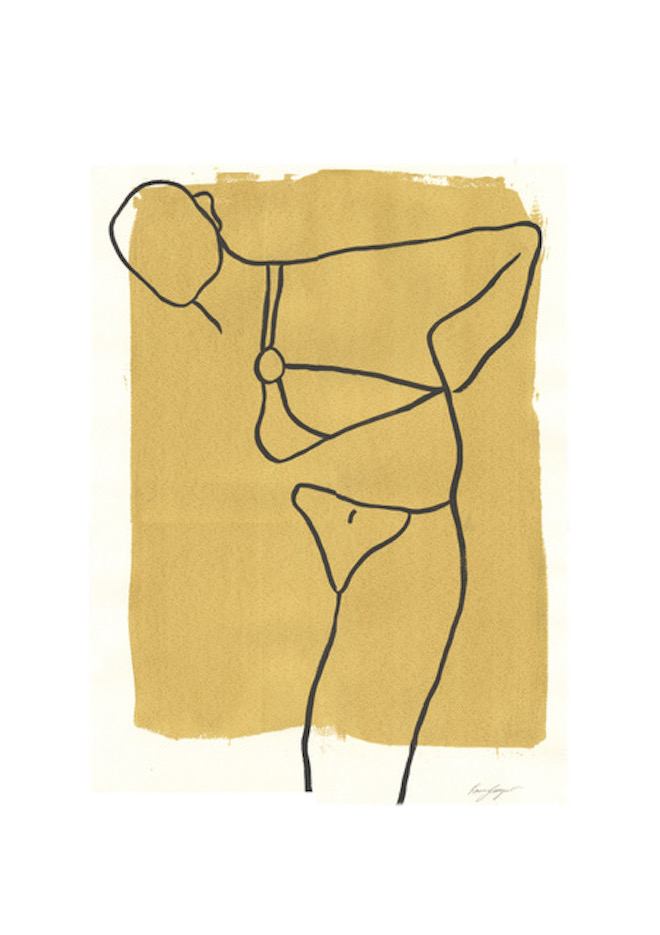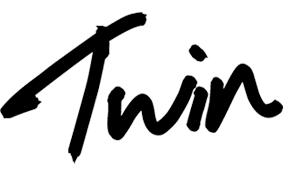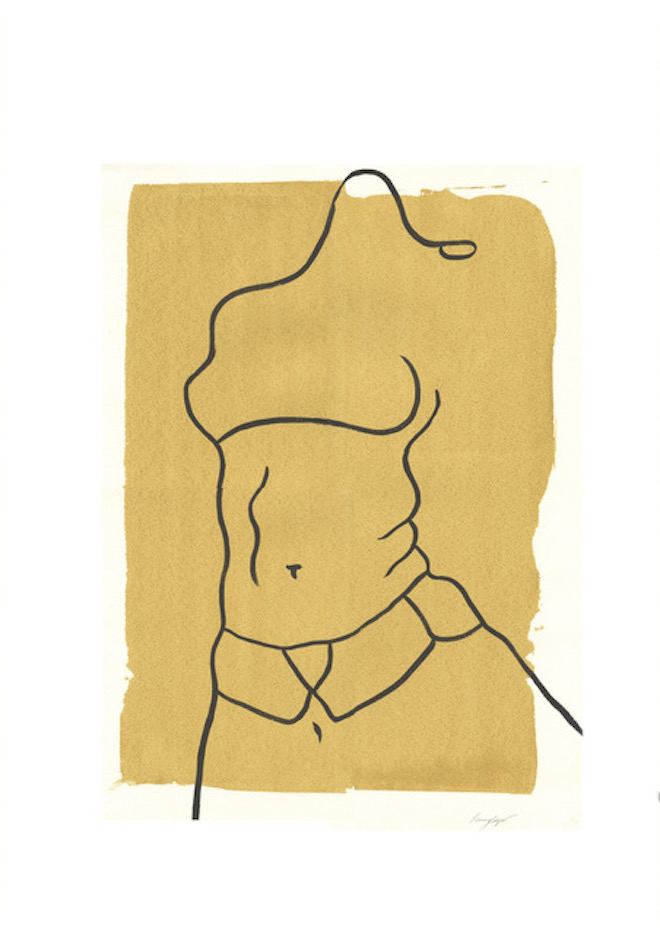Artist Ranny Cooper examines and explores the female form as a way of addressing issues around self identity and discovery. She shifts our usual associations away from sex and provocation and asks us instead to focus on the ways in which the body is bound in objectification and intrusion, yet also in admiration and desire. Cooper uses her own body as her muse as it has been a positive way for her to address the issues she faces with her own body politics. Inspired by Jenny Saville and her portrayal of the body and all of its fluid forms, Cooper enjoys celebrating this idea of the grotesquely beautiful. In her series ‘Unbound’, the minimal, fluid lines and colours of Cooper’s mix media drawings offer a thoughtful and sensitive representation of the female form. Her use of leatherwear highlights the friction between submission and empowerment as she depicts the action, restrictions and effects of harnesses as a means of representing the duality of lust and scrutiny that women’s bodies are subjected to.

Ranny Cooper, Unbound
Originally from Brighton, Cooper has been based in East London’s Hackney for the last five years, where she spent the first three at London College of Fashion studying Fashion Illustration. The product of a rather bohemian and idyllic childhood, Cooper thinks this may be where her openness towards nudity came from and why she doesn’t feel that her sexuality defines her. I don’t know if I am defined by my sexuality, but know that I address it very boldly. I have always been very sexually open with my body. I grew up in an extremely naked household – it is a good way for me to express how I am feeling as a women. A lot of people see my work and think of it in very black and white terms, as simply sexual, open and in your face. But when you understand the meaning behind it, it is actually very personal. So, it is about sexuality but the point is there is also much more behind the surface.
Cooper acknowledges that the personal element to her work is varied depending on the series she is focusing on. While she always uses the body as her canvas and main subject, the motives behind her use of it are diverse.With my body print series I was expressing different emotions that I felt when I was life modelling. When you are exposed to a crowd of people and you are nude it encourages a range of emotions and I would find so many different thoughts running through my head. It really does boil down to each individual pose having a unique emotion that comes with it. Then when it came to my series ‘Unbound’, I was addressing the misconceptions people often have around sexuality, especially when it comes to the use of leather and harnesses. I involved the harness as a means of highlighting the importance of control for women when it comes to their bodies, which can be both a positive and negative in todays society.
Over the last few weeks, Cooper has started working on a new project, ‘Dismemberment’. In this series she fragments the body. The project merges different parts of the anatomy to explore the cross section between where the human form goes from the sight of desire to the sight of grotesque. Cooper explains how she is taking a new direction with her use of the body as a canvas and her growing obsession with how different angles can make the figure look almost distorted. This project is a little less sexual in a way as it focuses on dismembered and deconstructed figures. I have always been interested in the body looking distorted and out of worldly in a way, which transpired into this idea of how the body can go from a site of desire to a site of grotesque. With this project I still use the naked body but by dismembering it I wish to express the chaos we are often faced with when we let our thoughts run away with us, highlighting the confusion and madness that the mind often provokes.
As Cooper readdresses her practice through the altered perception she now places on the body, she discusses how she defines beauty:
I believe that it is completely in the eye of the beholder. I don’t think there is a typical ideal of beauty. For me, beauty comes from weakness and imperfection. Like art, it is totally subjective and I really don’t think it can be defined any more. Obviously you have ideals that the media represents to people of how we should look, which is a big issue. When I started doing such figurative drawings, initially I focused on slender beautiful women but gradually this made me feel more and more uncomfortable so I started using myself as my own reference – that really made me target issues I had with myself and helped me come to terms with them. I don’t think beauty is a definition I think it is a perception.

Ranny Cooper, Unbound
With this idea of beauty as perception rooted in subjectivity, Ranny explains how Hans Bellmer, Louise Bourgeois and Jean Cocteau have been lifelong inspirations for her. Likewise, the minimalist linear drawings by Austrian artist Egon Schiele and Mapplethorpe’s fetishistic yet sensual images have been important artistic sources. More recently, she credits the work of photographer Maisie Cousins, whose zoomed images of the female body taken from the series ‘grass, peonies, bum’ are some of her favourites. While Ranny is keen to explore the possibility of living somewhere like Berlin, given it’s notably liberal attitudes within youth culture, she has decided to dedicate the next two years to nurturing her practice here in London. Ranny Cooper will be showing her new series ‘Dismemberment’ at Cafe 119 throughout April. In the meantime, you can follow her practice and intense obsession with poached eggs via her Instagram @rannycooper.


 PREVIOUS
PREVIOUS

 Twitter
Twitter
 Tumblr
Tumblr
 YouTube
YouTube
 Facebook
Facebook
 Instagram
Instagram
